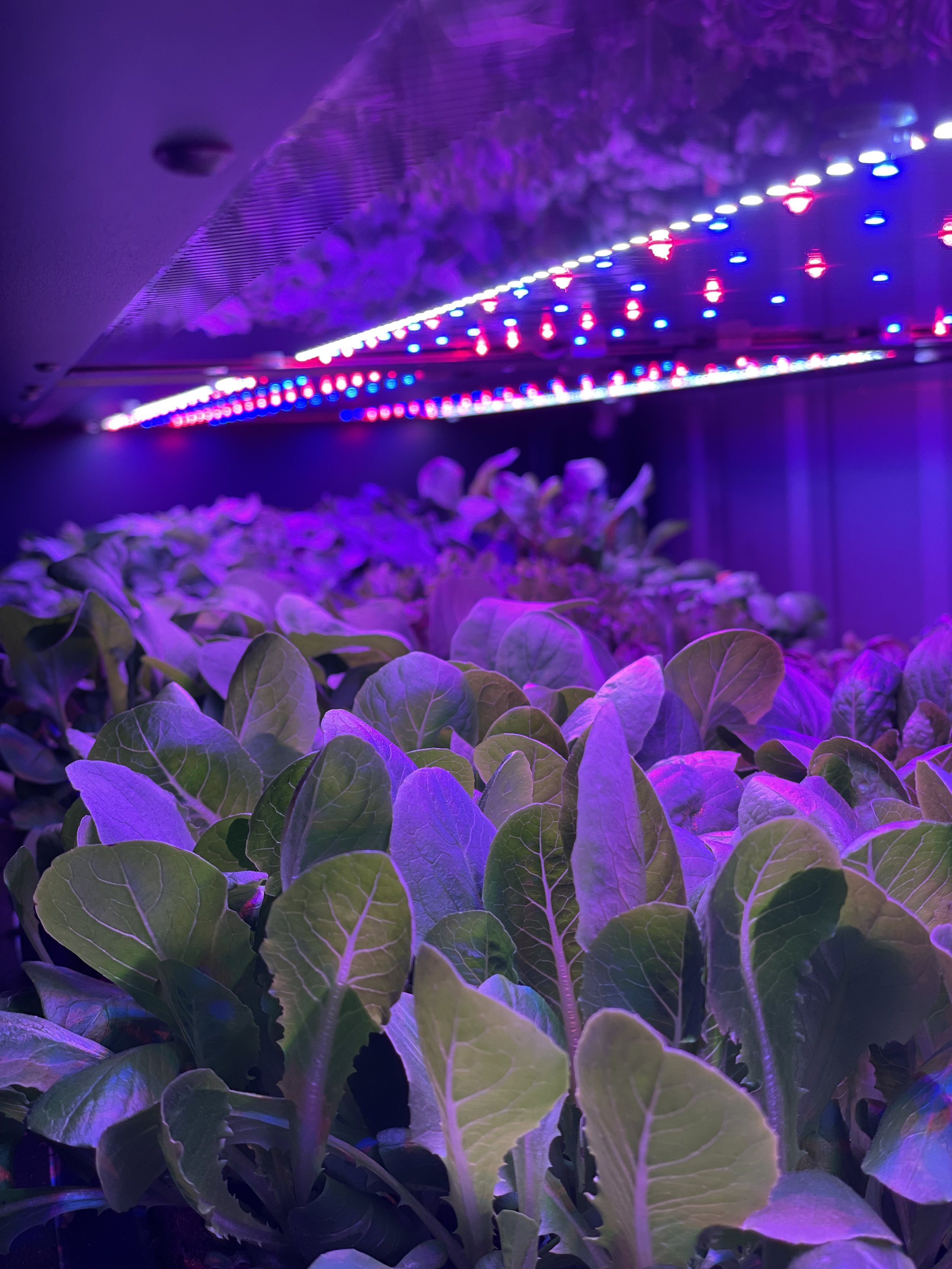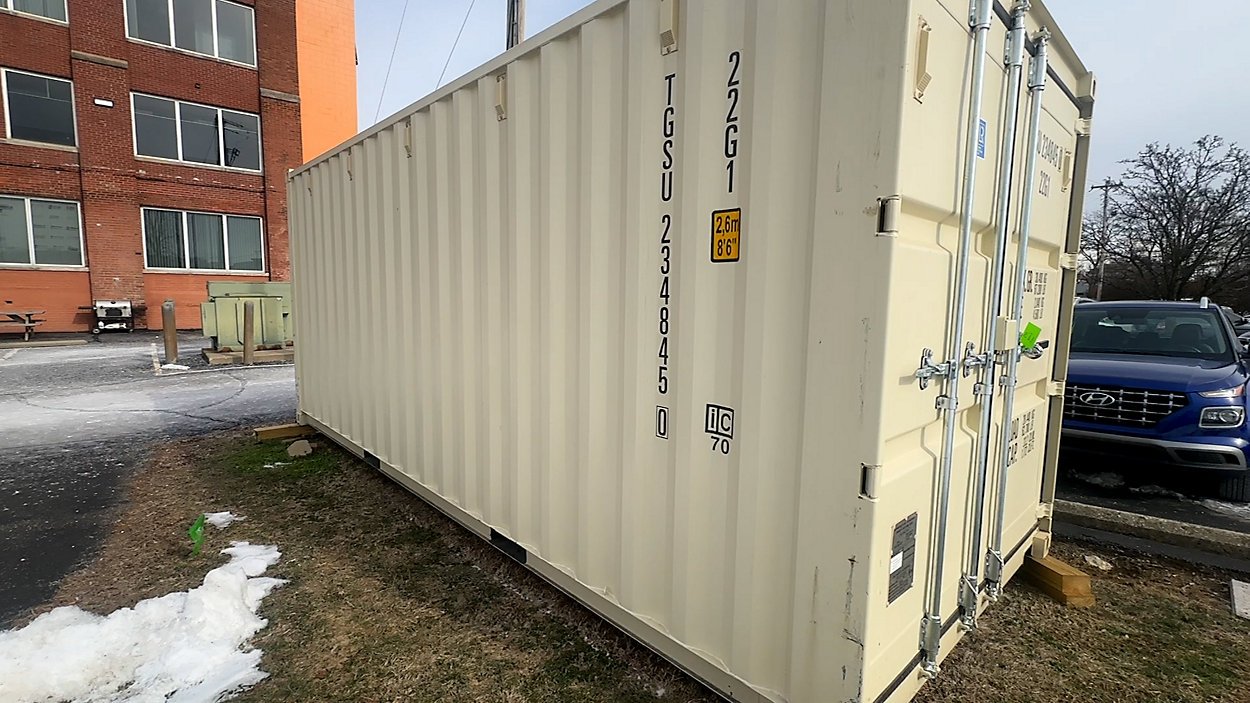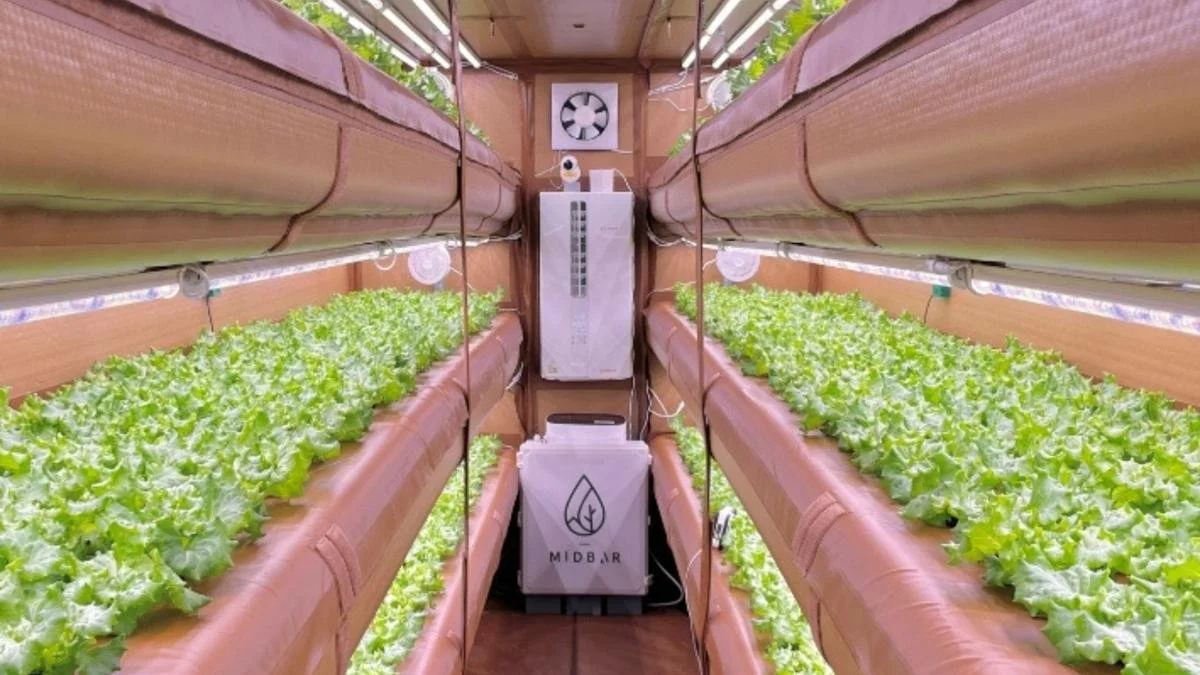
News About Farming in Shipping Containers & Limited Indoor Spaces
Japan's Wasabi Shortage: Is Climate-Controlled Farming the Answer?
A Tokyo-based agricultural startup, NEXTAGE, is cultivating high-grade wasabi in Yokohama using advanced technology. The variety, called Mazuma Wasabi, is highly regarded for its well-balanced aroma, spiciness, sweetness, and bitterness.
NEXTAGE has partnered with Macnica, a company specializing in semiconductors and IT equipment, to develop a small plant for wasabi cultivation in Yokohama.
The system ensures consistent production through data analysis, making it less vulnerable to weather conditions and labor shortages.
Demand for wasabi is rising due to the growing popularity of Japanese cuisine, but supply has struggled to keep pace. This initiative aims to bridge the supply-demand gap while introducing an agricultural method that minimizes dependence on environmental and human factors.
How Shipping Containers Are Shaping Urban Vertical Farming
Our global food systems are under siege, with climate change, natural disasters disrupting supply chains, and conflicts affecting agriculture in vulnerable regions. Add to that a booming population—set to reach nearly 10 billion by 2050—and the math becomes startling. Experts predict we'll need 70% more food to sustain humanity.
But, here's the problem – soil quality is deteriorating fast, and we're on track to lose most of the fertile ground we rely on. Traditional farming methods, while vital, seem ill-equipped to meet the challenge alone.
Urban vertical farming has emerged as an innovative solution – by growing crops in stacked layers within highly controlled environments, these systems use less land, water, and pesticides – with shipping containers offering a sustainable, space-efficient answer to the global food crisis.
Babylon Unveils Galleri Lite, A Game-Changer in High-Nutrition
The Galleri Lite builds on Babylon’s mission to engage and inspire individuals across industries, including senior living, corporate dining, hospitality, and education while fostering a deeper connection to nutritious food. Designed with accessibility in mind, this system offers a more affordable entry point compared to the flagship Galleri system, ensuring fresh, nutrient-rich produce is within reach for more communities. The Galleri Lite offers exceptional ROI potential, particularly for microgreens, as the system’s yield can offset its initial capital expense.
This unique capability positions the Galleri Lite as not only an accessible and affordable entry point but also a self-sustaining investment, making it an attractive solution for organizations seeking both economic and environmental benefits.
USA-ILLINOIS: Lockport Hydroponic Pesticide-Free Farm Takes Root in the Community
A financial consultant with a passion for sustainability and a Lewis University Romeoville alumna with social service and environmental science backgrounds are running a Lockport business – and loving it.Ajay Nagarkatte, a consultant to financial institutions who is an urban farming enthusiast, started Second City Greens in 2021 in Lockport. Frank Voltattorni III joined as farm manager a short time later.
Hydroponic plants grow in special nutrient-rich water instead of soil, Voltattorni said. Second City Greens also uses coconut coir – the natural fiber found on the outer husk of a coconut – as its supporting surface, he said.
USA-ST. LOUIS, MISSOURI: Neon Greens' Josh Smith is Transforming The Way We Think About Salad
Opened by Josh Smith in March 2024, Neon Greens isn’t your typical café or bistro. It takes the idea of farm-to-table a step beyond with an additional, next-door component: a hydroponic vertical farm.
Inside the farm and its attached “Harvest Capsule,” staff tend to crops like oakleaf, mizuna, sweet crisp, kale and more. Seeds are carefully sown before being placed in the plant nursery to grow; next, they’re plugged into a lush, living wall of lettuce, where water gently trickles down, nourishing the roots.
VIDEO: University of New Hampshire Webinar Examines Flex-Farming - Turning the Cafeteria into a Classroom
Paul Karpawich, Program Director for Uplift NH, hosted a presentation and discussion about driving environmental education and problem-based learning in school curriculum across New Hampshire.
Paul shared his organization’s success in working with schools and students to launch and sustain food waste diversion and composting projects and offered networking space to replicate similar projects in your own school.
Nimble Farms Debuts New Brand Across Tops Supermarkets
At the heart of Nimble Farms’ operations are modular, climate-controlled grow units housed in converted shipping containers. Designed to maximize productivity per square foot, each unit is equipped with energy-efficient LED lights, recirculating water and nutrient systems, and precise environmental controls.
This setup optimizes inputs such as fertilizer, water, and energy, enabling year-round production of a wide variety of high-quality, pesticide-free, non-GMO crops, including living lettuces, herbs, microgreens, and mushrooms. Emphasizing its commitment to sustainability, all Nimble Farms sites are powered 100% by renewable energy sourced from local solar, wind, and hydroelectric power.
Ohio U’s Green Team Promotes Sustainability and Food Security
Last November, the Ohio University Student Senate developed initiatives for two vertical gardens. The project, which aims to enhance student engagement and sustainability at Ohio U, was awarded $5,000.
The Senate worked to create a project that met engagement and sustainability goals but was also financially viable. Former Environmental Affairs Commissioner Caden Hibbs, worked with the company Just Vertical out of Canada, an indoor hydroponic farming company, and pitched their indoor wall gardens to support Ohio U.
Old Shipping Containers Turning Into Farms
Old shipping containers are now being used to fight against hunger in underserved communities.
Renee Camplese is bringing out vegetables that she says are better for you than organic.
“We have no need to use pesticides, so nothing is ever sprayed on our produce, ever,” said Camplese.
She said their greens hold more nutrition because of where it came from. The greens are from an indoor farm, 80 Acres Farm, in the
Cincinnati area.
“We started growing ten years ago in containers, old shipping containers that have been refurbished with lights and all of the piping and things that we needed to grow indoors, so it’s a hydroponic system. Then we have moved on from containers to large-scale production farms,” said Camplese.
Crater High School Uses Freight Farm to Challenge Traditional Farming Practices
CENTRAL POINT Ore. - Crater High School utilizes a cutting-edge agricultural project that grows food in ways that challenge traditional farming practices and inspire students to think about sustainability in new ways.
The Freight Farm uses a vertical hydroponic method to cultivate crops like lettuce, basil and cilantro — all without soil.
The plants are nourished by nutrient-rich water, with no more than five gallons of water used per week.
The idea for the Freight Farm originated when agricultural science teachers Kristin Kostman and Jim Miller attended a national conference, where they discovered the concept.
“Our students are involved in every step, planting the seeds, monitoring growth, and harvesting the crops,” Kostman said. “It’s a hands-on, immersive experience that teaches them the possibilities of sustainable, urban farming.”
Growing a Business Through Vertical, Sustainable Farming
80 Acres Farms began its journey inside a shipping container, as its team experimented with different farming technologies to develop efficient vertical systems. The company’s methodical approach to growth, testing and refining led to a pivotal moment when it launched its first 70,000-square-foot farm in Hamilton, Ohio.
The innovative facility is longer than a football field and includes 10 growing levels stacked on top of each other. The farm’s initial success was followed by further expansion, including the more recent Kentucky facility, which has been in operation since late 2022.
“Our goal from the start was to develop systems that could handle the stresses of population growth, farmland loss and climate change,” says Noah Zelkind, vice president of business intelligence and strategic finance for 80 Acres Farms. “We’ve learned from every farm we built, and now we’re focused on scaling up to bring fresh, healthy food to more people. It’s not just about growing food but about fitting into the community and using what’s already there.”
CANADA: From Seed to Table, Manitoba Business Brings Hydroponics Home
Living in Canada’s centre has its challenges. We can all attest that temperatures of 30 below can put a damper on many facets of living, including producing and consuming clean, locally grown foods.
What if actively gardening in mid-January was a possibility? What if local households, communities, retailers, and restaurants could grow their own fresh, quality produce, year-round, with affordable hydroponic gardens? Les Verts Living, a Manitoba-owned, innovative agricultural business, in partnership with T&T Seeds, has developed indoor hydroponic systems that do just so.
Owners Rachel Green and her father Kerry have dedicated their lives to agriculture and making nutritious, leafy greens accessible to tables throughout the province.
USA - TEXAS: FeedLot Funds Freight Farm Shipping Container Farm
Though there is still much planning and work to be done, Harper informed the council that the container will be attractive, use relatively little water and will likely be staffed part-time with volunteer opportunities available.
Among the many benefits touted by Harper and the council is the possibility for the setup to be a good educational experience for local school students. Using a shipping container and advanced hydroponic system, Community Mission Link hopes to grow about four acres worth of produce in a much smaller amount of space. This is the first use of Freight Farms by a nonprofit in the area that he knows of.
World’s First Inflatable Farm Uses 99% Less Water To Grow Vegetables In Deserts
At CES 2025, Jordanian company AirFarm introduced a new, innovative approach to indoor farming with its innovative inflatable modules that utilize aeroponics to grow crops faster and with never-seen-before efficiency.
By employing a micro mist aeroponic system, AirFarm achieves water usage reductions of up to 99% compared to traditional agriculture, making it a game-changer for water-scarce regions and urban farming.
The lightweight and portable modules are not only 75% lighter than conventional container farms but also designed for quick installation, requiring just half a day. This efficient design also enhances shipping logistics, allowing 10 units to fit into a single container, eliminating the need for a trailer.
Building Sustainable Gardens, One Tower at a Time
In addition to its ongoing work with schools, City Greens this year established a partnership with Gro iQ, a company that offers, in part, high-quality sensors that can accurately test hydroponic growth elements such as light, heat and carbon dioxide.
“The sensors that they have are significantly more comprehensive than what we’re already using,” says Levy. “We’re trying to figure out how to be as precise and accurate as possible with our growth cycles, and they’re helping us do that.”
Locally, City Greens has also donated a hydroponic container to the Beverly Hills Fire Department station on Rexford Drive, which uses some of the plants produced therein for their cooking.
Having a container at the fire station is “a way for people to see the difference between locally grown hydroponic food versus non-hydroponic local food,” says Levy.
Local organizations and groups supporting City Greens include the city of Beverly Hills, Beverly Hills Education Foundation, We Benefit Children, Beverly Hills Rotary Club and the Jewish Community Foundation of Los Angeles.
Why 2025 Is the Perfect Year to Start Your Hydroponic Farming Business
Hydroponic container farming is poised to be a transformative force in 2025, offering innovative solutions to contemporary challenges in food safety, local sourcing, supply chain resilience, health, and environmental sustainability. Here's why 2025 is an ideal time to embark on a hydroponic farming venture:
Enhanced Food Safety
Foodborne illnesses remain a significant concern, with consumers increasingly vigilant about the origins and safety of their food. Hydroponic systems, operating in controlled environments, substantially reduce the risk of contamination from pathogens like E. coli and salmonella. Additionally, the absence of soil eliminates the need for pesticides, addressing consumer concerns about chemical residues.
USA - MAINE: Farming Outside - And Inside - The Box
At the Good Table F oundation’s property in Castine, a nondescript tan shipping container sits alongside the driveway. But inside the container is one of the area’s most dynamic, high-tech hydroponic farms.
An all-volunteer organization, Good Table Foundation grows fresh greens for distribution through food pantries.
Founder Greg Nitzkowski had seen similar hydroponic container models in California. He and his wife Barbara were inspired to bring the concept to Castine, where they retired after being long-time summer residents in the area. They incorporated the organization as a 501(c)(3) nonprofit in 2023 and began operations in 2024.
The operation supplies fresh greens to Loaves and Fishes Food Pantry in Ellsworth and Caring Community Cupboard in Old Town. They operate the farm 365 days a year, and all of the produce they grow is donated. Volunteers from GTF harvest, process, and deliver the produce in a single day, delivering more than 200 4.5- ounce bags of greens each week. The mix can include kale, lettuces, arugula, and more, all packaged in compostable, labeled bags just as they might be in a traditional retail setting.
USA - OHIO: Urban Farming Initiative and Walnut Hills Redevelopment Foundation Partner to Grow Neighborhood Gardens
The Urban Farming Initiative (UFI) and the Walnut Hills Redevelopment Foundation are thrilled to announce a new partnership aimed at revitalizing and coordinating urban gardens in the Walnut Hills neighborhood. Through this collaboration, UFI will work closely with garden coordinators, volunteers, and community leaders to enhance the gardens' output, while also providing support for local events and programs.
As part of this initiative, Ben Booker, UFI's Executive Director, will lead the project. A University of Cincinnati graduate with an urban agriculture certificate, Booker brings extensive expertise in urban agriculture and community development.



















